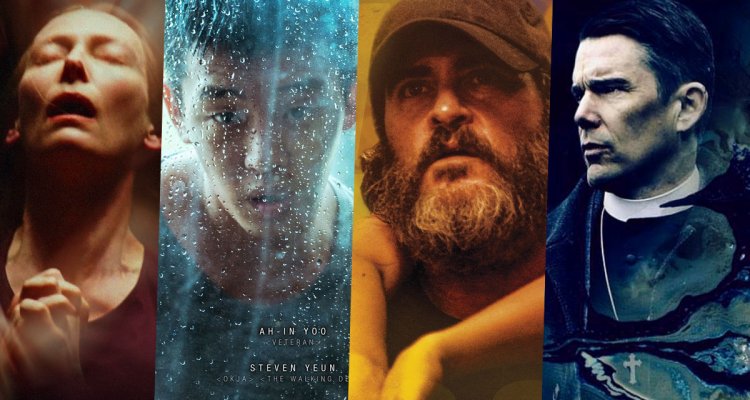15. “Shoplifters”
It is no wonder that this beautiful film won the prestigious Palme d’Or at this year’s Cannes Film Festival; it is both a pragmatic and a wondrous portrait of the human condition, that has us questioning what it means to be a family. Can the concept truly be defined by blood relation? If the people who gave you life and raised you aren’t giving you proper guidance, should they be considered family at all? Writer/director Hirokazu Kore-eda returns to his regular preoccupation with parents, children, and parentless children, and brilliantly challenges traditional ideas with his story of a makeshift collection of unrelated people who nonetheless call themselves the Shibatas. They take a new child into their home after noticing signs of her being abused and though not the most financially stable, and with criminal pastimes, they still raise her the best way they know how. Aiding the film’s emotional resonance is the tremendous acting from the ensemble with the standouts being Lily Franky as the family patriarch and the late, great Kirin Kiki as the grandmother. Flawlessly acted, heartrendingly written and powerfully told, “Shoplifters” is humanist filmmaking at its finest. – Matthew St.Clair [our review]
14. “Mandy”
A lurid, dreamy, demented foray into the well-traveled revenge genre told with fresh, inventive eyes, “Mandy” is both a moody tale of morality and righteousness and an invigorating crowd-rouser splashed with gory violence, quasi-medieval imagery and absurdist humor. So no, it won’t play well for everyone. But if you are on the right wavelength, writer/director Panos Cosmatos’ (“Beyond the Black Rainbow”) sophomore feature delivers. Featuring one of Nicolas Cage’s absolute best performances to date, “Mandy” makes great use of both sides of his acting persona. We see the tender, vulnerable side and the more recent Rage Cage, a man driven by blinding fury, judgment be damned (literally). “Mandy” is a curious cocktail of seemingly contradictory styles, but through Cosmatos’ masterful, stylish combination of class and pulp, it gets the best of both worlds. It is a tale about love and loss, grief and justice, and it’s a dream for a Nicolas Cage fan, one that (almost) makes up for every past Cage misstep. That’s one hell of a feat, and it’s just a glimpse into its glorious, metal-tastic greatness – Will Ashton [our review]
13. “If Beale Street Could Talk”
Given the state of the world, and the people in it, I’m not sure that we deserve Barry Jenkins. But with so many films on this list reflecting the uncertainty, despair, and alienation that we feel at the moment, praise the filmmaking gods that we have him, and “If Beale Street Could Talk.” Following up the remarkable success of “Moonlight,” his woozy tone poem Best Picture-winner, was never going to be easy, and Jenkins set himself a particularly tough task with an adaptation of James Baldwin’s novel. Fortunately, it’s another miracle: A movie about injustice that’s also the year’s most gorgeous, life-affirming love story, without undermining either the rage or the swoons it induces. With a decidedly tricky plot point about false accusations of sexual assault that treats everyone involved with kindness (that being a plentiful quality here), the film still stands as a monument to women, and Black women, in particular, delivering an adaptation of Baldwin’s work that does absolute justice to him while also standing on its own feet. Jenkins’ collaborators — particularly extraordinary newcomer KiKi Layne, Brian Tyree Henry (who steals his handful of scenes), DP James Laxton and composer Nicholas Britell — are more on their game than ever. And as continued evidence of the honing of all these major talents, we’re just grateful that ‘Beale Street’ is here and that Jenkins has decades of work ahead of him. – Oliver Lyttelton [our review]
12. “First Man”
Delivering a gorgeous exploration of the mind of one of history’s greatest introverts, Damien Chazelle flushed jazz out of his system and took on this contrasting project, crafting a beautifully shot, harrowing, and claustrophobic narrative. In contrast to “La La Land,” a bright, extroverted, and often cheery ode to Hollywood, “First Man” takes a somber, cold and enclosed approach to one man embarking on a trip to Earth’s natural satellite. But with this tale lacking the story conflict of “Apollo 13,” and Armstrong being an introvert’s introvert, a man who processes pain alone under the stars, keeps his friends at arm’s length, and travels to the most secluded place man has ever reached, its power is surprising. But then, Chazelle excels at making internal conflict external and several of the action sequences thrust you deep into the experience, creating intense, near vomit-inducing moments of thrill and vertigo. His interweaving of the physical and psychological make the movie a must-see. – Jason Ingolfsland [our review]
11. “Paddington 2”
Like a deliciously over-sized marmalade sandwich, “Paddington 2,” Paul King’s acclaimed follow up to 2014’s “Paddington,” is not only the best children’s movie of the year, but a film capable of warming even the most cynical critic (just look on Rotten Tomatoes, literally everyone adores this movie). Even beyond Ben Whishaw’s lovable titular bear, King has populated Windsor Gardens with a host of a fully rounded character, and he gives Hugh Grant (as the washed-up actor, and wannabe villain, Phoenix Buchanan) his best role, probably ever. Further, the entire Brown family, from Sally Hawkins’ Mary to Julie Walters’ Mrs. Bird, radiate with such sincere affection for Paddington, that you can’t help but wish for their success. And what about the plot? An Indiana Jones-like hunt for hidden treasure that sees Paddington, essentially, enact prison reform by winning over Brendan Gleeson’s tyrannical prison chef Knuckles McGinty with pink jumpsuits and well-crafted marmalade sandwiches, it includes so many callbacks and whimsical details that you’ll leave the film convinced there still is kindness in this crazy world and that Paul King should be allowed to direct anything he wants. – Christian Gallichio [our review]

